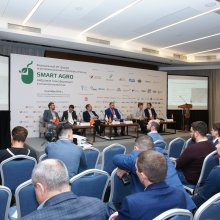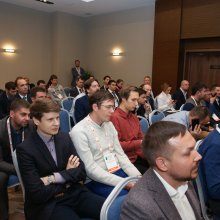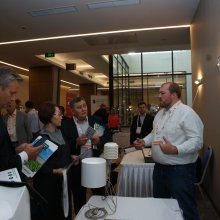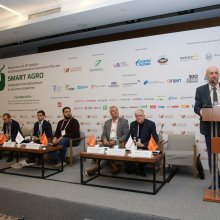About the event
Farmers are in need of digital networks and qualified staff
To enhance digital agro-industry, Russia needs to ensure total coverage of agricultural area with data networks and prepare specialists equally competent in IT and agriculture. Government project ‘Digital Agriculture’ is designed to help achieve these objectives, but this far, there is no consensus on the market as to what the latter document should look like. The trends and barriers were discussed at the Federal IT Forum of Russia’s Agro-industry – “Smart Agro: Digital Transformation in Agriculture”, held on October 8, 2019 at the Hilton Garden Inn Moscow Krasnoselskaya Hotel.
The Smart Agro forum was endorsed by the Council for IT and Digital Economy of the RF Chamber of Industry and Trade, The IoT Association, the Foundation for Internet Initiatives, Non-profit Partnership RUSSOFT, OEZ Innopolis, Institute of the Information Society, the Association of ICT Companies APKIT, Samara State Agrarian University, the Franco-Russian Chamber of Commerce and Industry (CCI France Russie), the CIO Club in the Central Federal District, and the International Academy of Communications.
Geosys was Golden Sponsor of the Forum, while GeosAero was Session Sponsor. The event was also supported by VideoMatrix, Gazprom Space Systems, and Sovzond Company. GroozGo, Mastertel, MBR Teleratsiya were General Exponents, accompanied by Matller, Sovzond Company, Pessl Instruments, Borlas and Geosys as Exponents.
The Forum gathered over 200 delegates from big agro-companies and food-processing corporations, farming enterprises, regulators, government organizations and development funds, domestic suppliers of IT solutions, software, telecommunication equipment and automated control systems, communication service providers, app developers, system integrators, and also business and industry media, analysts and experts.
The tone of the plenary session was set by the head of the Ministry for Digital Development and Telecommunications of Altai territory Evgeniy Zryumov, who said: “We need to stop looking down on farmers as if they were ignorant people, they are very forward-minded people: almost all of them use GLONASS-based space monitoring tools, and the only thing they lack is better Internet coverage.”
BIO-TON’s Head of ACS Department Sergey Konovalov pointed out that the main problems for Russian agricultural producers (both large and SMEs) are outdated and unreliable field maps, misappropriation of tangibles, fuel, crop protecting agents (CPAs) and seeds, and operating disturbances (primarily, when it comes to the field machinery speed, because operators’ remuneration is tied to output). All these issues may be addressed with help of digital technologies, provided that all fields are covered with communication networks.
Stanislav Dmitrov, Director for Innovations and Digitalization of Agro-Belogorye Group emphasized: “We install GLONASS equipment on all our machinery. But the operator knows exactly which areas of the field lack mobile reception – so he just stops there and discharges fuel or passes the CPAs to a private farmer. We need ubiquitous digital data infrastructure, ideally – from the field to the counter.” Dmitrov said he had talked to regional communication service providers and urged them to reach out to the federal telecom companies, so that someone made a business out of it and rolled out a dedicated network called Agro-Communications, for instance. “We are ready to pay for such network, like we pay for electricity or gas, but data channels are the domain of telecom operators or the government,” concluded Agro-Belogorye’s Director for Innovations and Digitalization.
Head of Innovative Technologies at Rostselmash Oleg Alexandrov agrees with his colleagues: “If there is no reception in the fields, it is a task for the Ministry of Communications, it’s not up to us to decide whether there should be LoRa or some other technology.” According to Alexandrov, Rostselmash is working on a feedback system to control the correctness of field operations with the machinery they make, and that would require full coverage of all agricultural lands with communication networks. “We equip our harvesters and other machinery with humidity, temperature, and treatment depth sensors – the commercialization is scheduled for 2020,” he specified, arguing in favor of the need for connectivity.
Representatives of the agro-industry named another problem, which is just as acute as connectivity for agricultural areas. It is the shortage of qualified staff, capable to implement digital technologies in this industry. “There are IT experts, who do not know the specifics of agriculture, and there are agriculture professionals, who have little understanding of IT,” defined the problem Stanislav Dmitrov. “There are very few specialists on IT in agriculture on the market”, agrees deputy CEO for development and resident interaction of OEZ Innopolis Vadim Galeev. “They need some very specific training, and the way we train IT professionals in Innopolis wouldn’t work in this case. Large-scale digital transformation requires special solutions.”
That said, Oleg Alexandrov from Rostselmash believes that the shortage of staff can be offset by the simplicity of technology: “It’s not complex, but simple solutions that win on the market. The technology should make sure that we don’t need any specially trained staff!”
The national project “Digital Economy of the Russian Federation” and ministerial initiative “Digital Agriculture” can help address the issues with network coverage for agricultural lands and lack of competent IT staff. But at this point, there is no consensus on the market as to what the latter document should look like. Thus, there are cracks between the Ministry of Agriculture and the Analytical Center with the RF Government. According to the leader of the analytical block for agricultural markets of the Analytical Center Elena Razumova, the draft document has deficiencies. “The document stipulates creation of a data base for agricultural producers on new types of weed plants or pests, that have appeared as a result of the climate change,” said Elena Razumova. The expert doesn’t understand the need for such a bulky tool.
Besides, Elena Razumova finds the target indicators listed in the ministerial initiative rather perplexing. ¨The indicators are tied to the enterprises, which have already implemented something. As a result, we will only deal with exemplary and big businesses,” she predicts. As for financing behind digitalization in the agro-industry, different drafts of the documents provide for different scenarios.
According to Vadim Galeev from OEZ Innopolis, overall, the investment into digital platforms is outlined correctly. “There is no need to subsidize each innovation. We only need products, solicited by the market,” he said.
Chairman of the Institute of the Information Society Yuriy Khokhlov believes that target indicators (such as, doubling the export of agricultural products by 2024) are high, but the document doesn’t explain how they will be achieved. “The first drafts of the document were absolutely unacceptable, but the current version still needs revision,” he said. The ministerial initiative doesn’t outline any tasks specific to the industry, such as development of industry-specific technologies. The general federal project “Digital Economy of the Russian Federation” is designed to address general policies, such as end-to-end technologies, for which roadmaps and other associated support measures are being developed,” says Yuriy Khokhlov.
The next session was dedicated to digital transformation and adaptation of Industry 4.0 approaches to the needs of the agro-industry and the specifics of Russia. Director for Development of the Foundation for Internet Initiatives Evgeniy Borisov spoke about the prerequisites for acceleration of implementation of digital technologies in agriculture. Yuriy Pekun, Geosys’ Head of Business Development in the Eastern Europe shed light on the role and the standards of satellite and meteorological monitoring for digital transformation of the agro-industry and precision farming. Rostselmash’ Project Manager in innovative technologies Oleg Alexandrov entitled his report “Digitalization as a driver of economic efficiency in agriculture”. Sergey Konovalov, Head of ACS Department of BIO-TON shared on the practices of implementation of digital technologies. Innopolis’ Vadim Galeev spoke about Innopolis – special economic zone – as a tool for IT companies, developing smart agriculture projects. CEO of VideoMatrix Farid Nigmatullin dedicated his presentation to Artificial Intelligence and video analysis for agro-industry. At the end of the session Denis Gerasenkov, Deputy Minister of Agriculture and Food of Samara Region, spoke about the geo-information system for the agro-industrial complex of the region.
The second session featured practical cases of digital transformation in the industry.
Alexey Brumin, Vice-Rector of the Samara State Agrarian University, showcased a cloud service called “The Lab for Advanced Agrarian Practices”. AgroTerra’s Director of Farming Operations Thomas Dorenwendt spoke about advanced analytics tools for optimization of production planning. Ecoculture’s CIO Igor Gul spoke about the challenges of implementing digital technology in a large agro-holding company. Geomir’s Igor Pavlov and Step Agro-holding’s Andrey Semerenko dedicated their report to digital transformation of a farming business based on “Fiel History” service. First Deputy CEO of Sovzond Mikhail Bolsunovskiy spoke about inventory control of agricultural lands based on space imagery.
The third session was dedicated to monitoring of agricultural lands and crops, and precision farming. GeosAero’s CTO Zakhar Zavyalov spoke about the application of pilotless aviation in precision farming. CBA-Avia’s Director Maxim Kondratyev shared on the practical implementation of pilotless aviation systems in agriculture in 2018-2019. Björn Drexler, First Deputy CEO of EkoNivaTechnika-Holding, also spoke about precision farming systems. His report was entitled: “Experimental agriculture / Lead Farm”. Klaas Vostok’s Product Manager in Russia and Eastern Europe Leonid Yakovlev told the audience about the capabilities of state-of-the-art agricultural machinery for precision farming. CEO of Magrotek Vyacheslav Kholodchenko spoke about forecasting crop yield and cost-effectiveness management of 1 hectare/field.
Traditionally for COMNEWS events, many participants of Smart Agro were able to find and make contacts with new potential customers and partners. Next year, at the 2nd Smart Agro forum scheduled for October 2020, organizers intend to explore new topics, which were voiced by speakers this year, and continue enhancing the forum as a professional networking platform for the government agencies responsible for digital transformation of the industry, digitalization departments from agro-industry and suppliers of innovative digital solutions.







